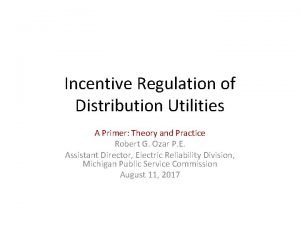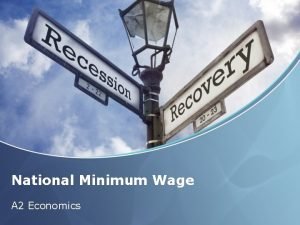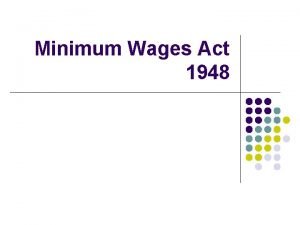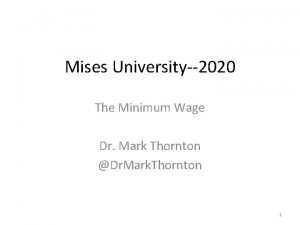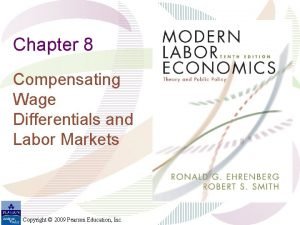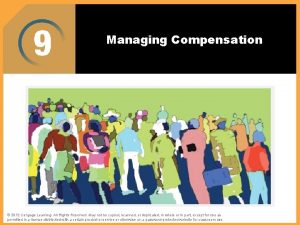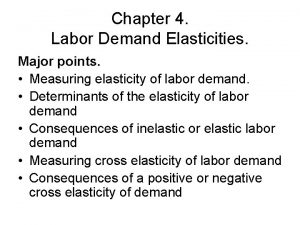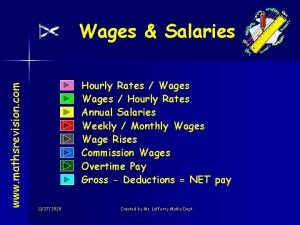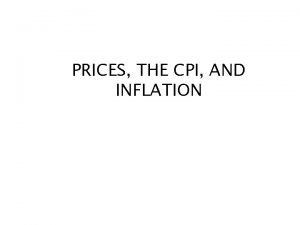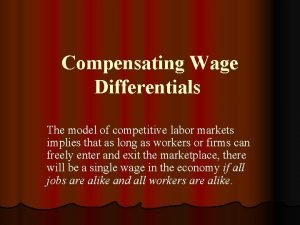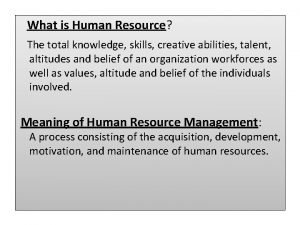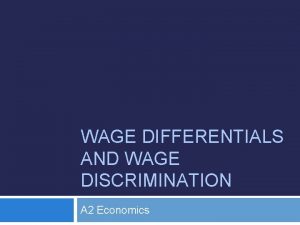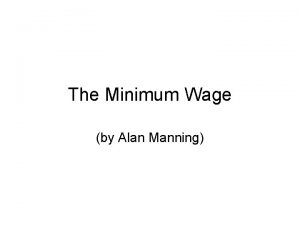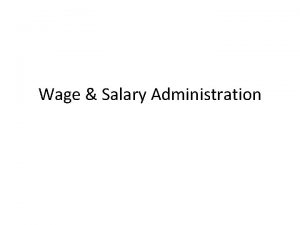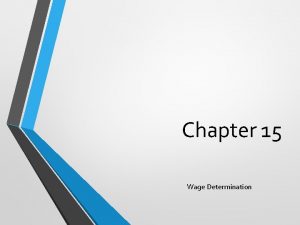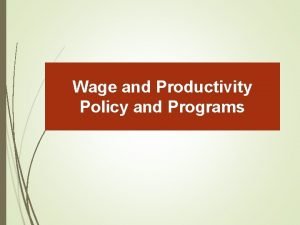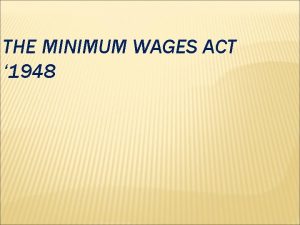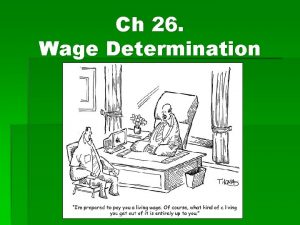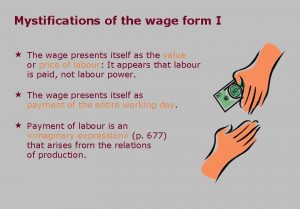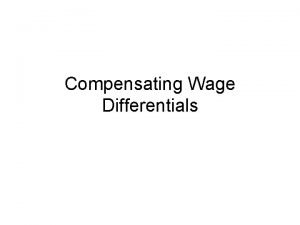Minimum Wage Advantages of Minimum Wages Higher wages


































- Slides: 34

Minimum Wage

Advantages of Minimum Wages • • • • Higher wages for workers Higher employee satisfaction Motivation of workers might increase Employees might stay in companies for longer Lower risk for conflicts Reduction of wage differences and income inequality Better chances for children from poor families Reduction of the discrimination of minorities Might increase GDP and overall consumption Higher tax revenue Better chances to get out of poverty Reduction of government spending on welfare The overall wage level might increase Health improvements

Higher wages for workers • One important advantage of minimum wages is that workers will have more money in their pockets at the end of each month. • This is especially crucial for people with a quite low wage. • By introducing a minimum wage, those people can afford more food and other things they need. • Thus, especially in industries which are known to pay quite poor wages, the introduction of minimum wages could significantly increase the income of workers.

Higher employee satisfaction • Employee satisfaction tends to be positively correlated with income levels. • This is quite logical since if you earn higher wages, you can afford more and will not have to worry too much about money and how to pay your bills. • Thus, the introduction of minimum wages may increase employee satisfaction, which may result in better working results.

Motivation of workers might increase • In general, the overall motivation of workers will likely increase if they are able to earn more money from their jobs. • Especially for people who work in low-wage jobs, raises are quite important since those people often need every dollar to buy food and to provide housing for their families. • If they are able to afford more due to the introduction of minimum wages, people may have a higher motivation to go to work and to really identify with the company.

Employees might stay in companies for longer • If they are able to earn more money, workers might also be more eager to stay in their company for a longer period of time. • For instance, if there are shitty working conditions in a company and people are barely able to survive from their low wages, chances are that those workers may sooner or later quit their job. • However, through the introduction of minimum wages, those workers might be more willing to stay in their company for longer since they might be happier with their overall situation.

Lower risk for conflicts • Differences in wages and wealth levels often lead to serious conflicts. • People are often quite envious and want to have the best lives they could. • For instance, if you see your neighbor driving a nice car, chances are that you want to have the same living standard. • However, if you work in a job that only pays quite poorly, chances are that you will never be able to afford such a car. • You might even have to use public transport since you may not be able to afford any car at all. • Through minimum wages, you might earn sufficient money to buy you a car and your level of envy might be lower compared to the previous situation. • Thus, especially in countries where there is a high level of economic inequality, minimum wages may lower the social tension between people.

Reduction of wage differences and income inequality • Also from a fairness perspective, it should make sense to introduce minimum wages in order to increase the level of inequality in a region. • For instance, there are many jobs that are physically demanding but only pay a few bucks an hour. • It is totally understandable that workers in those jobs feel frustrated since they work hard but could still not provide for their families without financial aid. • Thus, for those people, minimum wages could improve their conditions at least to the point where they no longer have to rely on government subsidies.

Better chances for children from poor families • It has also been shown by many studies that the chances a child has in life significantly depend on the income and the wealth of a family. • For instance, if you come from a wealthy family, your parents will be able to afford good education or even a private teacher for you. • Therefore, chances will be much higher that you can attend a good university and get a well-paying job after that. • However, if you grow up in a poor family, chances are that you will not have these opportunities and you might be stuck in poverty. • Through the implementation of minimum wages, the chances for children from poor families for a better life might increase since parents might have more opportunities to support the education of their kids.

Reduction of the discrimination of minorities • Many low-wage jobs are carried out by ethnic minorities. • Thus, the wage level is generally much lower for those minorities compared to the average person. • Therefore, introducing a minimum wage would greatly benefit minorities since their average wage level would increase significantly. • Since minorities have it generally harder in many parts of their daily life, raising their income levels should also be considered to be quite fair in order to compensate for those issues.

Might increase GDP and overall consumption • Since the average income level of people would increase through the implementation of minimum wages, also the average GDP would increase. • In turn, since people would have more money in their pockets, they might be more eager to spend it for consumption. • This may lead to a circle of higher consumption, economic growth and less unemployment, which could benefit the whole economy, at least as long as this circle can be sustained.

Higher tax revenue • With higher minimum wages and the higher income people have to spend, also the government tax revenue may increase substantially. • This additional money can be used for infrastructural projects in order to improve the living conditions of the local population. • Thus, the introduction of minimum wages may not only benefit low-wage workers, it might benefit the whole local population due to a better infrastructure.

Better chances to get out of poverty • If the minimum wage scheme is implemented in a proper manner, it might also be a great way for people to get out of poverty. • Many people who currently work in low-wage jobs will have to spend almost their whole money for their daily life and will not be able to save too much. • However, saving and investing money is quite important to get out of poverty. • Thus, it is crucial to introduce minimum wages so that people can save and invest more in order to accomplish a better financial situation in the future.

Reduction of government spending on welfare • Another upside of minimum wages is that they may reduce government spending on welfare. • If minimum wages are high enough to cover the expenses of people for their daily life, those people might no longer have to rely on government subsidies. • This would greatly reduce government spending and the money that would be saved could be used for other projects instead. • Thus, through the implementation of minimum wages, governments may also be able to save plenty of money in the long run.

The overall wage level might increase • Minimum wages may not only increase the wages of jobs that pay quite poorly, it might also increase the wages of people that are not in this category at all. • For instance, if the wages for low-wage jobs increase, the gap between skilled and unskilled labor becomes smaller. • However, since the productivity gap tends to stay the same, chances are that also the wages for skilled labor would increase. • Thus, the overall wage level might increase due to the introduction of minimum wages.

Health improvements • It has also been proven by many studies that our health levels greatly depend on our financial conditions. • For instance, if you are wealthy, you will be able to afford the best medical treatment in case you get sick. • Thus, your chance to survive and also to avoid consequential health issues might be far lower compared to a person who will not be able to financially afford such a treatment. • Thus, through the introduction of minimum wages, the health conditions of millions of people may be increased significantly.

Disadvantages of Minimum Wages • • • • Restrictions for companies Potential job losses Less flexibility in difficult times for firms Higher structural unemployment Labor-intensive industries might lose competitiveness Outsourcing to foreign countries Higher income is often correlated with higher prices More workers may be replaced by machines Effectiveness depends on implementation Some groups of people may no longer find a job May trap people in poverty Adjustments to the local market might be necessary May be against the fundamental right of freedom May give people the incentive to drop out from school Minimum wage is still too low in some areas

Restrictions for companies • Although there are several advantages from minimum wages, there also some problems related to them. • One disadvantage of minimum wages is that it restricts companies regarding their wage level. • Companies are no longer free to set wages according to natural market forces, they are forced to pay higher wage even if the productivity of certain workers may not justify that. • Thus, employers may complain that minimum wages could be considered to be unfair in certain niches.

Potential job losses • Minimum wages may also lead to job losses for workers in some industries. • Some jobs simply do not create too much value for a firm. If companies are forced to pay minimum wages in those jobs, they will likely reduce their staff in the long run. • Thus, for certain jobs, it might not be suitable to introduce minimum wages since they simply not provide enough value for firms. • Therefore, in order to avoid job losses, refraining from the implementation of minimum wages in those branches might be a good idea.

Less flexibility in difficult times for firms • Especially in financial crisis situations, many companies suffer from difficult financial conditions. • In those times, firms may lower wages in order to survive. • However, if there are minimum wages, this might not be possible and many companies may go bankrupt due to strict minimum wages. • Thus, minimum wages may also lead to serious problems for firms in financial crisis situations and governments should consider to give companies some room of discretion in those difficult financial times.

Higher structural unemployment • Through the introduction of minimum wages, the labor costs in low-wage industries increase. • This increase in labor costs also implies an increase in unemployment since firms will have a bigger incentive to lay off workers. • Thus, even though minimum wages could improve the conditions of many workers, some may also suffer from unemployment due to the introduction of those minimum wages and their situation will be even worse than before.

Labor-intensive industries might lose competitiveness • There is also a big difference regarding the dependence on labor across industries. • For instance, while there are some industries which have quite automated processes and do not need to much workers anymore, there also some industries which have to rely on manual work. • Especially for industries which are labor-intensive, chances are that companies in those branches may lose their competitiveness due to the introduction of minimum wages since their production costs may increase dramatically.

Outsourcing to foreign countries • Another argument against the introduction of minimum wages is that companies could outsource their jobs to foreign countries which do not have any minimum wages at all in order to reduce labor costs. • This is especially true for big international companies which have the infrastructure to outsource most jobs if necessary. • Thus, the introduction of minimum wages may also lead to local job losses since companies might simply decide to outsource their production processes to foreign low-wage countries.

Higher income is often correlated with higher prices • Although the introduction of minimum wages may improve the financial conditions of some people in the short run, the positive financial effect may become lower or may even vanish in the long run since the overall price level may also increase. • When people have more money, they are also more likely to spend more. • However, with constant supply and higher demand, prices tend to increase and the positive impact of increases in minimum wages may be lowered to a certain extent.

More workers may be replaced by machines • Since the marginal costs of labor increase due to the introduction of minimum wages, firms may have a higher incentive to lay off workers and to replace them with robots instead. • This is especially true for jobs that are highly standardized. • Those jobs could be easily outsourced to machines and more people may become unemployed due to that in the future.

Effectiveness depends on implementation • The effectiveness of minimum wages also vastly depends on how they are implemented and if there are certain loopholes. • For instance, if there are too many loopholes regarding minimum wages, they may actually have no effect at all since companies may use those loopholes in order to continue to pay quite low wages. • Thus, it is crucial to implement those minimum wages in a proper manner so that they really improve the financial situation of millions of workers.

Some groups of people may no longer find a job • Even though many people might be motivated, there are some people out there whose productivity level is quite low and it might not justify to pay minimum wages for this kind of work. • Thus, companies may decide to rather lay those people off than to pay them the minimum wage. • Moreover, those people might also have a quite hard time finding a job again if their productivity is too low to make it attractive for companies to employ them.

May trap people in poverty • Although minimum wages are actually meant to get people out of poverty, the opposite might happen. • Some people start their career in jobs that pay quite low wages but after they have done a pretty good job, they may get promoted and earn much more. • However, if those people will no longer be able to work for a low wage due to the introduction of minimum wages, they might not have a chance to obtain entry into the job market and may be trapped in poverty due to that. • Thus, minimum wages may even trap some people in poverty instead of improving their financial condition.

Adjustments to the local market might be necessary • There also huge differences in the costs of living across countries. • For instance, if you live in New York, chances are that you have to pay large amounts of money just for your rent. • However, if you live in a rural area, you might have to pay a much lower rent. • Thus, if the minimum wage was equal in both regions, the person living in the rural area would have much more money to spend on other things compared to the person living in New York. • Thus, there should be differences in minimum wages depending on where a person lives in order to ensure the fairness of the minimum wage framework.

May be against the fundamental right of freedom • Opponents of minimum wages might also claim that the introduction of those minimum wages may violate the fundamental right of freedom. • Some people think that the government should simply stay out of the job market and that market forces should determine the wages of people instead of restricting companies with mandatory minimum wages.

May give people the incentive to drop out from school • Some children may also drop out of school due to the implementation or the increase of minimum wages. • For some youngsters, the wage that could be earned in jobs that pay minimum wages might seem quite attractive and they may choose to drop out of school to get a job instead of finishing school and attending college. • However, while this may lead to a financial benefit in the short term, it may imply serious financial issues in the long run since education and salaries are highly correlated. • Thus, minimum wages may also give people a flawed incentive to drop out of school.

Minimum wage is still too low in some areas • In some regions of our planet, there already minimum wages. • However, they can be rather seen as some kind of political playground instead of a valid tool to fight inequality and poverty. • In many cities, the minimum wage will not even be enough to cover basic expenses. • Thus, even with minimum wages, many people still have to rely on government aid in order to survive. • Therefore, if minimum wages are too low, they might not have any positive effect at all.

Conclusion • As we have seen in the previous analysis, there are many benefits of minimum wages. • However, there also many problems related to the implementation of minimum wages and it significantly depends on the region and the local job market whether minimum wages make sense or not. • Governments should evaluate all the pros and cons quite carefully in order to avoid mistakes that could lead to job losses for many people.

Sources • https: //en. wikipedia. org/wiki/Minimum_wage • https: //www. dol. gov/agencies/whd/minimum-wage/state • https: //www. acas. org. uk/national-minimum-wage-entitlement • https: //www. gov. uk/national-minimum-wage-rates
 Disadvantage of raising minimum wage
Disadvantage of raising minimum wage Minimum wage romania
Minimum wage romania Slovakia minimum wage
Slovakia minimum wage Croatia minimum wage
Croatia minimum wage The minimum wage act 1948
The minimum wage act 1948 Liberals vs conservatives minimum wage
Liberals vs conservatives minimum wage Minimum wage
Minimum wage Whats an introductory paragraph
Whats an introductory paragraph Impact of contemporary issues to the filipino entrepreneurs
Impact of contemporary issues to the filipino entrepreneurs The minimum wages act 1948
The minimum wages act 1948 Mises minimum wage
Mises minimum wage Proposal for a directive on adequate minimum wages
Proposal for a directive on adequate minimum wages Absolute maxima and local maxima
Absolute maxima and local maxima Advantages of minimum price
Advantages of minimum price Wage schooling locus
Wage schooling locus The sticky wage model
The sticky wage model Hedonic wage model
Hedonic wage model Wage roll
Wage roll What is a wage
What is a wage Wage curve in hrm
Wage curve in hrm Cross wage elasticity of labor demand
Cross wage elasticity of labor demand Mathsrevision.com
Mathsrevision.com Establishing strategic pay plans in hrm
Establishing strategic pay plans in hrm Reservation wage
Reservation wage Cpi formula example
Cpi formula example Compensating wage differentials
Compensating wage differentials Unpurchased goodwill method is otherwise called as
Unpurchased goodwill method is otherwise called as Wage fund theory
Wage fund theory Objective of wages and salary administration
Objective of wages and salary administration Wage differentials definition
Wage differentials definition How many wars did louis xiv wage between 1667-1713
How many wars did louis xiv wage between 1667-1713 Wage regulation machinery
Wage regulation machinery Mincer wage equation
Mincer wage equation Wage a good warfare with the prophecy
Wage a good warfare with the prophecy Mdot prevailing wage
Mdot prevailing wage
